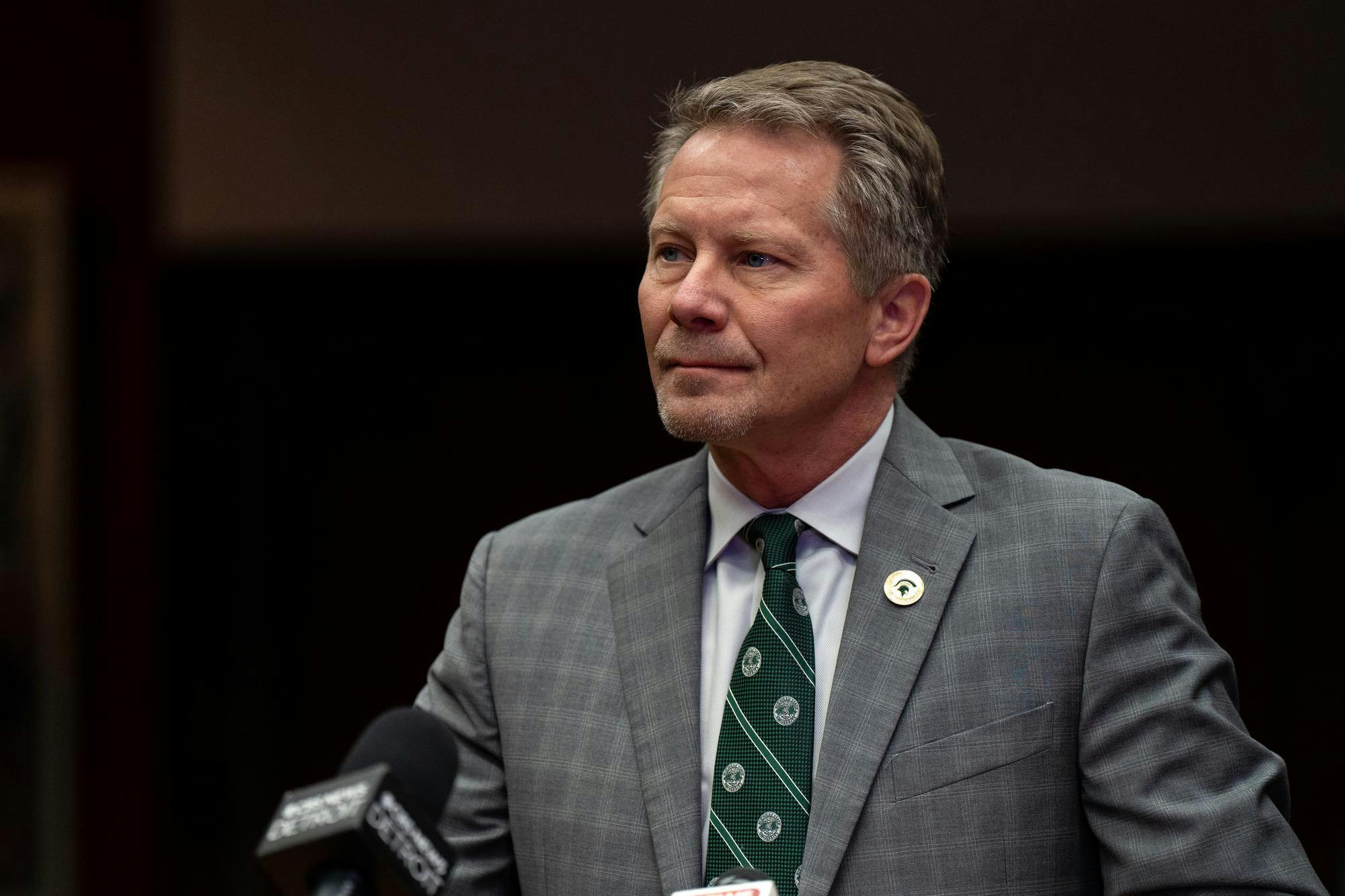The State News met with MSU’s president and leaders of campus programs aimed at preventing sexual misconduct to discuss how the university has changed since Nassar’s abuse thrust it into national scrutiny.
"Our university is in a very different place than it was," said MSU President Kevin Guskiewicz. "It's not perfect, but there has been meaningful work done to build a solid foundation of accountability that we must continue to build on."
The leaders insist they’re rectifying past mistakes, though they struggled, at times, to articulate precisely how.
Leadership once separated, now 'aligned'
The documents offered a look into the beginnings of the contentious, often-dysfunctional relationship between MSU’s board and administration that has mired the university in controversy for years since.
The publicly elected trustees wanted to avoid being too closely associated with an administration then-facing intense public scrutiny.
In some ways, that separation has represented an unusual schism between a university’s executives and governing body. But some have also argued that the distance created a necessary oversight for an embattled administration.
Guskiewicz said he’s actively working to close the gap.
"Our board and our administration is aligned on this," Guskiewicz said, referencing MSU’s efforts to move forward from the Nassar scandal and improve its handling of sexual violence.
"Not just on this particular issue, but I feel really good about how we’re working closely together… we are one team, as I’ve been saying, and I’m confident that we’ll move together."
On the subject of MSU’s efforts to improve its handling of issues of sexual violence, Guskiewicz said each board member is "well-informed" and "weighing in."
"I know that they trust this leadership team as we move forward, and again, they each bring a unique and different perspective, which will be a part of our decisions moving forward."
Though Guskiewicz emphasized his collaboration with board members, he’s previously indicated a line must be drawn.
While he was the sole remaining candidate for MSU’s presidency last November, The State News reported that Guskiewicz told faculty in written statements he would only accept the job if the board vowed not to interfere in his administration.
The board — which has been accused of interfering in the last two administrations — signed pledges in December agreeing not to do so in Guskiewicz’s.
General counsel’s changing relationship with OIE
The long-privileged documents revealed that, amid the Nassar crisis, MSU’s general counsel strategically edited the results of Title IX investigations to enhance their defense strategy in civil lawsuits.
Experts told The State News that those edits imperil the credibility of MSU’s investigations, as Title IX is supposed to be independent of administrative influence.
Support student media!
Please consider donating to The State News and help fund the future of journalism.
Asked about the interference Thursday, Vice President for Civil Rights and Title IX Laura Rugless said the practice stopped years ago — but struggled to articulate exactly how.
Title IX investigators "seek legal guidance" from the general counsel's office "just like any employee," Rugless said. "But, the line is drawn in terms of making decisions about the outcomes of the cases."
That boundary was established after a 2019 Department of Education investigation criticized MSU for having the general counsel review Title IX investigations, she said.
But, a more recent outside investigation complicates that claim.
After mandatory reporting failures prompted the removal of MSU’s business dean, the university’s board hired law firm Quinn Emanuel to investigate the circumstances surrounding the case. In its report, the firm noted that the general counsel’s office asked the Title IX office to reopen an investigation into sexual harassment by a professor. The general counsel’s office also meddled in a decision to not amend the formal complaint in the case, the firm found.
Asked about whether that finding contradicts her claim, Rugless said, "There’s a lot of experts, and there can be differences of opinion among very reasonable people."
"That was really before I arrived here," said Rugless, who started at MSU a few months after Quinn Emanuel issued its report. "I’d really like to talk about what we’re doing now."
Asked if the same sort of interference Quinn Emanuel found would happen now, under her, Rugless said, "I think I would have to look at each one of these situations individually."
"It’s difficult to answer hypotheticals," she said.
Improved record-keeping
The documents revealed that when it was needed the most, MSU’s records-keeping of Nassar was laden with mistakes.
In 2016, university staff discovered they failed to give an investigator nine files related to sexual misconduct — including one about Nassar — for a federal review.
At the time, university leaders said the mistake came about because the Office of Institutional Equity, which first compiled the records, failed "to implement any sort of file organization system."
In 2023, outside consultants found that the software used to sort OIE cases was hindering the department’s efficiency.
Based on the consultants’ recommendations, OIE implemented a new file organization system in December 2023.
The "very robust" case management system documents "every note, every interaction," Rugless said.
"We have a complete record of our cases," she said.
Balancing advice from survivors and lawyers
The documents also shed light on the dynamics of MSU’s unguarded, internal strategizing. Often, administrators believed they faced a choice: win in the court of public opinion today or prevail in the court of law down the road.
The "right things" suggested by some administrators were consistently at odds with what was pushed by university lawyers trying to minimize legal exposure.
In the years since, MSU has attempted to reframe those discussions in hopes of meeting legal obligations without compromising on accountability, the administrators said Thursday.
Rather than see legal advice and the right thing as "oppositional," the university is trying to find the "both/and," said Carrie Moylan, a social work associate professor who advises the president on RVSM issues.
MSU has worked to "get other voices in the room in addition to the lawyers," she said, with steps like creating the RVSM workgroup and creating a vice presidency focused on Title IX and civil rights.
"I want to encourage us not to frame that as an either/or, but sort of a both/and," Moylan said.
Asked for specific examples of places where MSU has found that compromise, Moylan said "I think it’s not about the specific examples there."
"I can’t really think of a specific example to point you to, but I do think that the change in structure is significant," she said.
The debates detailed in the long-secret documents, however, offer little room for collaboration, with MSU’s goal to minimize legal liability often being incompatible with what survivors demanded of the university.
Asked what he would do when faced with one of those decisions, Guskiewicz said he will simply "do what I know is right for this community, that’s what I’m going to do."
Wavering on remaining demand
Long before the secret documents were made public, some survivors demanded the university allow an independent ethics and compliance firm to review MSU’s handling of Nassar and make recommendations for improvements.
The documents’ seclusion long provided a roadblock, as the firm would ideally have access to those internal records, they argued. Once they were released, calls were renewed.
Asked about the documents’ release by The Detroit News last month, Guskiewicz suggested that sort of review was out of the question.
But, university spokesperson Emily Guerrant expressed more receptiveness in an email Thursday.
“(Guskiewicz) acknowledges that additional work still needs to be done at the university,” she said. “There are active conversations among university leaders and stakeholders as to what some of those additional steps might be.”
Discussion
Share and discuss “MSU: Wrongdoing revealed by Nassar documents not a reflection of MSU today” on social media.







